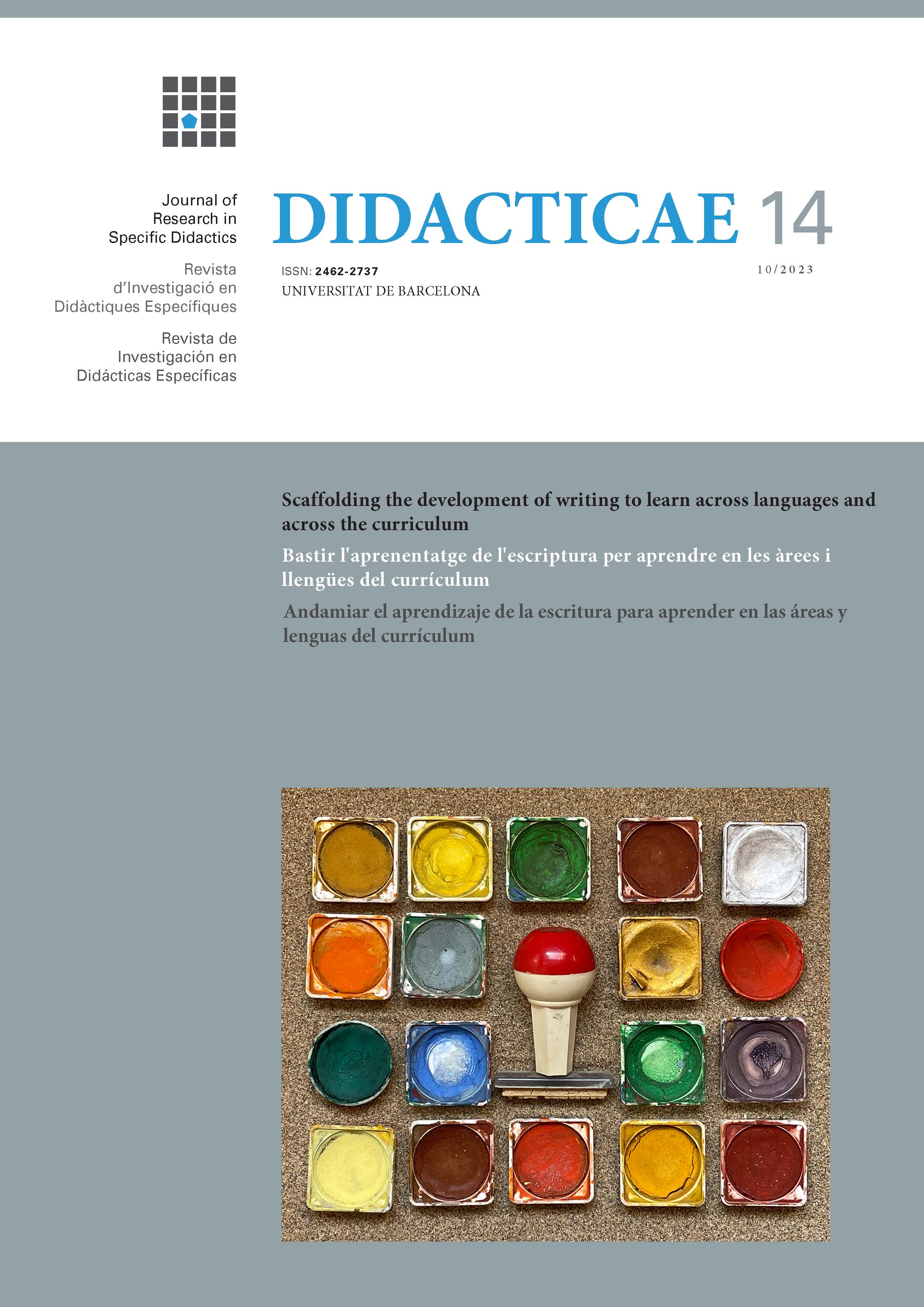Andamiar el aprendizaje de la escritura para aprender en las áreas y lenguas del currículum
Scaffolding the development of writing to learn across languages and across the curriculum
DOI:
https://doi.org/10.1344/did.2023.14.4-9Keywords:
Reading to Learn, CLIL, genre-based pedagogyAbstract
Introduction to the monographic section.
References
Acevedo, M. C. (2020). Bringing language to consciousness: Teacher professional learning in genre-based reading pedagogy. [Tesis Doctoral, The Open University, Reino Unido]. https://doi.org/10.21954/ou.ro.00011316
Acevedo, C., Rose, D. y Whittaker, R. (Eds.). (2023). Reading to Learn, reading the world. Equinox Publishing.
Agosto, S. E. y Mateo Girona, T. (2015). La enseñanza de la escritura académica en la universidad española. Análisis de experiencias y prácticas relevantes. Cultura y Educación, 27(3), 639-648. https://doi.org/10.1080/11356405.2015.1072355
Ahern, A. y Smith, K. (2022). Promoting equitable literacy expectations in CLIL: Empowering student teachers’ attitude shifts through Reading to Learn in service-learning. AILA Review, 35(2), 297-320. https://doi.org/10.1075/aila.22024.ahe
Ahern, A., Whittaker, R. y Blecua, I. (2019). Reading and writing to learn. A principled approach to practice in CLIL/Bilingual classes. E-Teals: Electronic Journal of Teacher Education and Applied Language Studies, 9, 23-40. https://doi.org/10.2478/eteals-2018-0011
Ballesta Pagán, F. J., Lozano Martínez, J., Cerezo Máiquez, M. C. y Castillo Reche, I. S. (2021). Participación en las redes sociales del alumnado de educación secundaria. Educación XX1, 24(1), 141-162. http://doi.org/10.5944/educXX1.26844
Blanco Fernández, J.M. y Moyano, E. I. (2021). Propuestas de enseñanza de la lectura y la escritura con base en la Lingüística Sistémico-Funcional: contextos anglófono e hispanohablante. D.E.L.T.A., 37(3), 1-32. http://dx.doi.org/10.1590/1678-460X202152956
Carlino, P. (2009). Desarrollo profesional de docentes para leer y escribir a través del currículum. En P. Carlino y S. Martínez (Coords.), Lectura y escritura, un asunto de todos/as (pp. 51-90). Universidad Nacional del Comahue.
Custodio Espinar, M. (2019). Los principios metodológicos AICLE (aprendizaje integrado de contenido y lengua) en las programaciones docentes del Programa Bilingüe de la Comunidad de Madrid: un estudio empírico. [Tesis Doctoral, Universidad Complutense de Madrid]. https://eprints.ucm.es/id/eprint/55485/
González-Fernández, N., Ramírez-García, A. y Salcines-Talledo, I. (2018). Competencia mediática y necesidades de alfabetización audiovisual de docentes y familias españolas. Educación XX1, 21(2), 301-321. http://dx.doi.org/10.5944/educXX1.16384
Halliday, M. A. K. (1985). An introduction to functional grammar. Hodder Arnold.
Halliday, M. A. K. y Matthiessen, C. M. (2014). Halliday´s introduction to functional grammar (4.ª ed.). Routledge.
Lorenzo, F., de Alba Quiñones, V. y Cruz-Moya, O. (Eds.). (2021). El español académico en L2 y LE. Perspectivas desde la educación bilingüe. Peter Lang.
Mateo Girona, T., Uribe Álvarez, G. y Agosto Riera, S. E. (Eds.). (2022). Revisión y reescritura para la mejora de los textos académicos. Octaedro.
Moyano, E. I. (2007). Enseñanza de habilidades discursivas en español en contexto pre-universitario: Una aproximación desde la LSF. Revista Signos, 40(65), 573-608. https://dx.doi.org/10.4067/S0718-09342007000300009
Murillo, F. J. y Duk, C. (2020). El Covid-19 y las brechas educativas. Revista Latinoamericana de Educación Inclusiva, 14(1), 11-13. http://dx.doi.org/10.4067/S0718-73782020000100011
Navarro, F. (2019). Aportes para una didáctica de la escritura académica basada en géneros discursivos. D.E.L.T.A., 35(2), 1-32. http://dx.doi.org/10.1590/1678-460X2019350201
Ouyang, F., Zheng, L. y Jiao, P. (2022). Artificial intelligence in online higher education: A systematic review of empirical research from 2011 to 2020. Education and Information Technologies, 27(6), 7893-7925. https://doi.org/10.1007/s10639-022-10925-9
PIRLS (2021). Estudio internacional de progreso en comprensión lectora. Informe español. Secretaría General Técnica. Centro de Publicaciones. Ministerio de Educación y Formación Profesional. https://sede.educacion.gob.es/publiventa/d/26866/19/0
Real Decreto 217/2022 por el que se establece la ordenación y las enseñanzas mínimas de la Educación Secundaria Obligatoria. MEFP (Ministerio de Educación y Formación Profesional) (2022). BOE 76, de 30 de marzo de 2022. https://educagob.educacionyfp.gob.es
Rose, D., Acevedo, C. y Whittaker, R. (Eds.). (2023). Reading to Learn, reading the world: How genre-based literacy pedagogy is democratizing education. Equinox Publishing.
Rose, D. y Martin, J.R. (2012). Learning to write, reading to learn. Genre, knowledge and pedagogy in the Sydney School. Equinox Publishing. (A. Bustelo Tortella, Trad. 2018). Leer para aprender. Lectura y escritura en las áreas del curriculum. Pirámide).
Sharkey, J. y Peercy, M. M. (Eds.). (2018) Self-study of language and literacy teacher education practices: Culturally and linguistically diverse context. Emerald Publishing.
Whittaker, R. (2018). Reading to Learn in CLIL Subjects: Working with content-language. CLIL. Journal of Innovation and Research in Plurilingual and Pluricultural Education 1(1),19-27. https://raco.cat/index.php/clil/article/view/359370
Whittaker, R. y García-Parejo (Eds.). (2017). Monográfico. Lenguaje y Textos, 46. https://doi.org/10.4995/lyt.2017.8712
Whittaker, R. y García-Parejo, I. (2018) Teacher learning for European literacy education (TeL4ELE): Genre-based pedagogy in five European countries. European Journal of Applied Linguistics 6(1), 31-57. https://doi.org/10.1515/eujal-2017-0021
Whittaker, R., García-Parejo, I. y Ahern, A. (2023). Working with Reading to Learn at undergraduate level in Spain: a learning journey. En D. Rose, C. Acevedo y R. Whittaker (Eds.), Reading to Learn, reading the world: How genre-based literacy pedagogy is democratizing education (pp. 161-176). Equinox Publishing.
Zawacki-Richter, O., Marín, V. I., Bond, M. y Gouverneur, F. (2019). Systematic review of research on artificial intelligence applications in higher education–where are the educators? International Journal of Educational Technology in Higher Education, 16(1), 1-27. https://doi.org/10.1186/s41239-019-0171-0
Downloads
Published
Issue
Section
License
Copyright (c) 2023 Isabel García-Parejo, Aoife Ahern

This work is licensed under a Creative Commons Attribution-ShareAlike 4.0 International License.
The authors who publish in this journal agree to the following terms:
- Authors retain copyright and grant the journal the right of first publication.
- Submitting a paper does not involve paying any fees.
- Texts will be published under a Creative Commons Attribution Share-Alike 4.0 International License that allows others to share the work, provided they include an acknowledgement of the work’s authorship, its initial publication in this journal and the terms of the license.
- When citing works published in Didacticae, both the autor and the journal must be cited.
- Didacticae does not accept any responsibility for the points of view and statements made by the authors.



